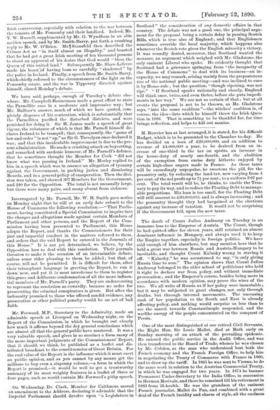M. Rouvier has at last arranged, it is stated, for
his difficult Budget, which is to be presented to the Chamber to-day. He has decided on a loan of £28,000,000, and an addition to revenue of £4,000,000 a year, to be derived from an in- crease of one-third in the tax on spirits, an increase in the house-duty of nearly one-fourth, and the abolition of the exemption from excise duty hitherto enjoyed by certain high-class sugars made in France. As these taxes will be exceedingly unpopular, he sweetens the pill, for the peasantry only, by reducing the land-tax, now varying from 4 per cent. of the net profit up to 7)fr per cent., to a uniform 3.97 per cent. The total result will be, he thinks, to enable the Trea- sury to pay its way, and to reduce the Floating Debt to manage- able proportions. His loan is too small, for the Floating Debt will still amount to £30,000,000, and is always increasing; and the peasantry thought they had bargained at the elections against any increase of taxation. It would not be surprising if the Government fell, upon the new taxes.






































 Previous page
Previous page